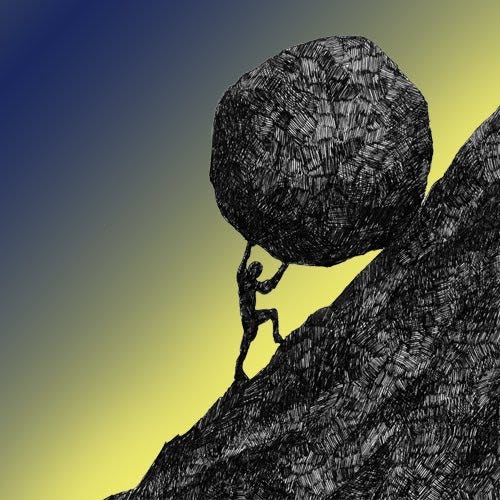
Emotional Intelligence, Leadership
What Pain Can Teach Us About Leadership
“Shelley, I’ve had this ring for a while.” She took it off her finger and showed me. “I gave this to myself as a gift after I completed a really big climb.” I looked down. It was a simple silver ring with a mountain scene carved into it. I said nothing in reply. I was still trying to catch my breath. “Inside I had it engraved,” she said. As she held it up, I could see the etching in the sunlight. “Inside it says – ‘We do not conquer the mountain, we conquer ourselves’.” I choked back the tears and looked away. Luckily, I was already at the back the group, where none of the other hikers could see me. And I thought to myself, now it begins… —————– Every 4-5 years I take what I often refer to as my spiritual pilgrimage. The first one was Kilimanjaro. The second was the high passes around Everest. I pick something insanely hard that requires deep physical exertion and then I go off, by myself, on a guided expedition with other hikers I’ve never met before. Why do I do it, I’m not really sure. I’ve found that at these times I’m usually searching for something. Maybe I’m searching for meaning. Maybe searching for inspiration. Often at these times I’m at a crossroads in my life and wondering what the next challenge or direction should be. There’s something magical that happens when you put your body through an extreme test. At least for me. Your mind switches off. The experience forces you to get into your body in a different way. To become more present to it. To become aware of it. To learn to rely on it. Things seem simpler, less complicated. The stories and lies we tell ourselves fall away on the trail. The only thing that really matters at that moment is pushing yourself to keep going. To take step after another painful step. The other thing that often falls away is ego. In that moment when Cindy showed me her ring, it annihilated what was left of mine. I had sized her up earlier in the day, I looked to be in better shape. I’d done more challenging hikes in the past – mind you it was the very distant past. But still. I should have been crushing day 2. And instead, I was the caboose. With more and more distance opening between me and the rest of my group no matter how hard I pushed myself. The shame was rising in my cheeks. But I just couldn’t go any faster. I hadn’t trained enough. I had assumed my base level of fitness would carry me through, and it wasn’t. The importance of pain in cultivating humble leadership The physical world can teach us so many important lessons. I talk a good talk about humility and cultivating humble leadership or servant leadership. It comes up all the time in leadership sessions. Just yesterday I was talking about the
October 16, 2024
|
5.7 min read

Emotional Intelligence, Leadership, Spirituality, Well Being
Want to feel more joyful? Think about this.
Our failure to know joy is a direct reflection of our inability to forgive. Charlotte Jojo Beck I came across this quote the other day and it caused me to really pause and think. As human beings, we tend to look at joy as something that’s attained once we’ve completed a series of steps. I see this a lot in my coaching practice. I’ll have joy when I get this promotion. I’ll be able to tap into joy when I no longer work for this horrible boss, or when I feel more confident in my skillset. I’ll have joy once I understand what my purpose and my true path on earth really is and have a plan for making it happen. It’s not wrong to seek change, to want to grow or to want to improve our circumstances. The problem is in thinking that “fix” alone will solve the problem of not having enough joy in our lives. Our mental construct often frames joy as something we must earn. The truth is joy is accessible now – in our imperfect lives, our imperfect careers, our imperfect leadership, our imperfect team and family dynamics. The issue is that we can’t often access it because we’re too busy blaming ourselves or others for the perceived problems in our lives. Forgiveness is often an inside job Beck’s quote speaks to the path we need to take to access what’s already available to us. And more often than not, the person we need to forgive the most is ourselves. Forgiveness is about letting go of the protective armor Or maybe anger and resentment is projected outwards at the people around us. We find ourselves locked into judgment and blame of others for the things they have done to us. The things we have been subjected to – unfair expectations, abuse, trauma, bad leadership, bullying, being taken advantage of. The list could go on and on. Perhaps it shows up as passive aggressiveness or full blown aggressiveness with others. Or maybe avoidance. Forgiveness begins with the intention to let go of the armor of blame and defensiveness and a willingness to touch the vulnerability that sits underneath the anger. Perhaps it’s the shame of having been humiliated publicly. Or of having been abandoned and feeling isolated and unwanted. Or the regret and shame of not standing up for ourselves with a difficult person. When we can face that vulnerability and meet it with compassion and love for ourselves, we find ourselves on a much more joyful path. For a long time, I carried a lot of anger and resentment about a previous work situation. It was years ago, when I had just transitioned my career, and found myself in a situation where I had been set up to fail. It wasn’t until I really leaned into the feeling that was sitting under the anger – humiliation, and allowed myself to feel it without trying to push it away, that I could let it go.
June 20, 2024
|
4.4 min read

Emotional Intelligence, Mindfulness, Well Being
Pain is Inevitable, Suffering is Optional
The title of today’s blog is a quote that has been attributed to many notable talking heads, including the Dali Lama. And it’s the events of last week that really brought it home for me, as in the wee hours of Friday morning, when I should have been peacefully sleeping, I was awakened by a massive migraine attack, complete with nausea and all the fun things a migraine can throw one’s way. The bottom line – it was an unrelenting 24 hours of hell. And not just on the physical front. Especially not only on the physical front. In-between unsteady trips to the bathroom my mind was awash with anxiety. What’s going to happen to all my client appointments tomorrow? Cancelled. What’s going to happen to my blog I need to finish and get out by the end of the week? Not happening. What if this wrecks my business? Clients are going to think I’m unreliable. How am I supposed to plan and manage my engagements when something like this can strike without a moment’s notice? What if this puts undue stain on my marriage? Me being up keeps him up. How much can my husband really take? It left me drained, emotionally and physically, but also quite reflective. Because at some point, in the midst of all the strife, strain and obsessive worrying, I realized I had a choice. Not a choice of whether I get to have migraines – unfortunately I don’t have that kind of power! But a choice on what perspective I get to take on the situation. And it’s the perspective I take that leads directly to how much suffering I must endure. What does it mean to suffer? To break this down, let’s think about what suffering means. It’s worth noodling on this considering the Buddha said many a time that “life is suffering.” On the surface of it, not the most upbeat way to view our journey around planet earth. But it depends on how you look at it. I’ve often defined suffering as “resistance to what is.” Resistance creates pressure. And pressure creates stress. And so, when folks enter my virtual office these days and say things like they’re burned out and stressed out, I believe them. They are. But I also say the solution lies not so much in having more time in the day to address a never-ending list of to-dos, but more in the way we manage our energy relative to the problems life throws our way. Because unfortunately, like it or not, life will throw us problems. That’s the one thing we can always count on. The real problem is we think we shouldn’t have problems. And therefore, we spend a lot of time resisting said problems, which creates a lot of suffering. Recognize any of these? If only I’d had a better childhood, then I wouldn’t be navigating all the difficulty I am right now. They were wrong to fire me. If they had really valued me,
February 26, 2024
|
5.5 min read

Authenticity, Emotional Intelligence, Leadership
Consider this if you struggle to be assertive
We are often told we need to be assertive. Assertive, but not aggressive. And that can be a tall order for many of us, especially those of us that learned to make our way through life as the pleaser/appeaser. For those of us that fall or have fallen at some point into this category (myself included) when we try to make a conscious shift, we may find ourselves over correcting and drawing a much harder line than we intended. Imagine a pendulum swinging all the way from the left to the right. We feel guilty about it, and may find ourselves going back and forth in our heads thinking – “Did that come across as rude? “Did I overdo it?” “Do I need to apologize?” Maybe we do end up apologizing, maybe we’re not sure, but things are awkward. This assertiveness thing is too hard, too sticky. And maybe we’re better off just doing what we do best – going along to get along. Or maybe the shift is an unconscious one and perhaps the resentment we have shoved down for so long finally boils to the surface and we blow our top like a fiery volcano. This explosion becomes another mess we need to clean up and we find ourselves full of shame, guilt, we over apologize, maybe we beat ourselves up about it and punish ourselves and we double down on trying to be the pleaser, because good people don’t do things like this, right? If I was a better person, I would have been able to keep my cool and wouldn’t have reacted that way, right? In my opinion, assertiveness is one of the hardest things to get right, mainly because we have so much baggage around it. When I really started looking at the roots of this for myself, I had to go deep. Find the root cause If you’ve never met me in person, outside of the virtual world of zoom, there is something about me you will notice instantly. No, not my dazzling smile or my bright blue eyes, as lovely as they may be. I’m 6 foot 1. If I were male, you probably wouldn’t bat an eyelid. But even though humans are getting taller and taller these days due to better nutrition and living standards, 6 foot 1 for a woman is still really tall. And I didn’t shoot up like a weed later in life. I’ve always been tall. All my baby records were off the charts. I was always in the top 1% of height for my age, since about birth. So you can imagine that when I started elementary school I definitely stood out in the room, pun completely intended. And I bet you can guess what happened. I got teased. Bullied is the word we would probably use now. And it was relentless. It was every day, so much so that in the mornings I’d be nauseous and never want to go to school, because I knew what
February 15, 2024
|
6.7 min read

Emotional Intelligence, Relationships, Spirituality
The Beauty of Grace
I’ve been noticing a trend in popular culture lately as it pertains to relationships. Evidently, we live in a toxic world, full of narcissistic people who don’t deserve to have our friendship or our comradery as colleagues. We are often told by various self-help guru’s and other talking heads that we need to cut these people out of our lives. You know the kind of problem people I’m talking about. They’re the selfish, difficult ones who don’t respect boundaries. Who take and never give. And the most appropriate response is to ghost them, particularly if it’s a personal relationship. Ghosting a colleague or a boss at work is a bit tricker but many of us find ways to “work around” problem people or secure our escape in other ways, perhaps by changing departments or jobs. The problem is, it’s just not this simple. And there comes a point at which you can’t keep avoiding problem people, trust me I’ve tried. I’m not in any way advocating tolerating abuse, but there’s a difference between abuse and dislike. There’s a difference between abuse and valuing different things. We can put up wall after wall after wall, but the interesting thing about life is that it will keep sending you the same challenges over and over until you rise to the occasion and look more deeply inwards at what is really going on. Grace under pressure I’ve known my friend Morgan for years. She’s the amazing artist type, somewhat erratic, flies by the seat of her pants, creative and fun. I’m not, and that has been a point of contention over the years, especially as it relates to timeliness and honoring appointments. I expect her to agree to a time to meet and be there at that time. It doesn’t always happen. And so the tension had grown and grown in our relationship – I was becoming increasingly resentful of her tardiness, and I made it personal. That she didn’t respect me, that she didn’t care, that she didn’t give a damn. We had fought about this in the past and I just didn’t have the energy to re-engage, plus, she’s a better fighter than I am. I was ready to walk away from the relationship. So the other day I showed up for a walk at 8 am, the agreed time, and I rang the door and I waited. No Morgan. I called. No answer. I waited about 5 minutes and then I left. I went and got gas. I was looking at my phone, deciding which yoga class to go to instead, and I saw her name pop up. Normally I would have avoided the call – she lost the opportunity to walk with me, she can bear the consequences, and this friendship really is on its way out. So be it. Instead, I took the call and told her I’d come back to walk after I got the gas. Why did I do it? I’m still not sure. But I
February 8, 2024
|
6.8 min read

Emotional Intelligence, Leadership, Spirituality, Well Being
An antidote for impostor syndrome – but it’s not quite what you think
Impostor syndrome is one of those interesting and universal things – in my opinion we all suffer from it. It shows up in many ways – failure to try new things because we’re afraid we’re going to fail, we don’t speak up in a meeting and so we never get credit for the idea, we don’t ask for the promotion, we don’t ask for help, we avoid asking for feedback or we over defend if we do get it, we overwork something to death because it’s not quite perfect yet, we fail to advocate for ourselves… We all suffer silently and repeat the same patterns I could go on and on. And we’re somewhat aware of the cost of this, as it makes life a lot more painful to live. We KNOW in our heads that we suffer from impostor syndrome. We might read books on it, we’ve taken the online quiz, maybe even our therapist told us. So we look for new techniques on how to solve this problem, we look to apply a new perspective and think carefully about what the morning affirmation needs to say (that is, if we remember to do it.). Maybe we practice meditation hoping and praying it will disappear, or we call our doctor and ask for a prescription for the daily anxiety we’re battling and just can’t seem to shake no matter how successful we are, no matter how many things get ticked off the to do list. Because there’s always more. We practice self-care because that’s the solution, right? A massage, getting the nails done, we tell ourselves that we need to be kinder to ourselves. But deep down we KNOW we don’t deserve it. Our nails look great and inside we’re still a mess. And we go about our business of repeating the same cycles, the same patterns of suffering, because obviously there’s no real fix to this, otherwise somebody would have figured it out by now. Impostor syndrome can’t be solved by the same thinking that creates it There is a fix. The problem is we’re often looking in the wrong place. Impostor syndrome can’t be solved by the same problem that creates it. It’s not a thinking problem. It can’t be solved in the head. It can only be solved in the heart. The heart – an interesting concept for many of us to take in. It’s a place many of us aren’t super familiar with and frankly don’t have much experience with. And yet we all have one. How does this happen and how can this be? Because adulthood often entails learning how not to feel things. Learning how to hide things. Learning how to cope with the difficulties of life, and feelings will just get in the way and get us in trouble. We learn early on as children that feelings are often scary and if we express them, we’ll probably get punished, or worse. We learn how to not take emotions to work because emotional
October 17, 2023
|
5.7 min read
Emotional Intelligence
Shelley Pernot, otherwise known as the Irreverent Guru of Mindfulness, muses on life, leadership and everything in between. Your one stop shop for career tips, leadership tips and daily inspiration!

It was a privilege to work with Shelley as my leadership coach! The process was structured and yet flexible enough to meet needs as they arose. Shelley helped me to grow, learn more about myself, and to really achieve what I set out to accomplish. We worked on planning, navigating a promotion successfully, and so much more! I experienced many successes as a result of working with Shelley, she has great resources, knowledge, and really helps with setting the foundation to this coaching work. She won’t let you down!
Stacy Campos
Regional Coordinator
Having the opportunity to have Shelley as my Leadership Coach could not have come at a better time in my career. I was recently promoted to CFO and was new to the Senior Management Team. Shelley helped me navigate joining the team as well as helped me to determine who I wanted to be as a leader. The Leadership Circle Profile helped our team to discover our blinds spots and to be able to understand each other better. Working with Shelley not only has affected my professional life in a positive way, but also my personal life. She helped me take leaps and has given me the resources to continue this journey of self-improvement. If you’re looking to find more about yourself and how you can be the best version of yourself, I highly recommend working with Shelley.
Kristen Spedale
CFO
I have been working with Shelley for the past 2 years on my leadership development journey. What I thought would be a straight line, I soon learned with Shelley’s guidance, was a winding path with several ups and downs along the way. Shelley supported me as I took a deep dive into my professional and personal history and learned how it affects my approach and my perceptions. She helped me to slow down and recognize certain behaviors and understand that I can pivot in the moment or try again next time. Ultimately, my work with Shelley turned out to be so much more than what I expected. Her approach to coaching was exactly what I needed.
Nicole Naassan
Senior Vice President, Consulting
I’ve learned more about leadership in the past six months working with Shelley than I have in my 10+ year career. She is an incredible coach with many tools in her toolbox. The guidance and mentorship I’ve received from Shelley has been life-changing. She will challenge your limiting beliefs and inspire new ways of thinking.
Margaret Soltis
Creative Director
I highly recommend Shelley if you need a coach, thought partner, and guide as you consider the next steps in your career. She provides practical tools and advice to help launch your career exploration, but most importantly, she is an expert at helping you cut through the noise of your limiting beliefs. At the end of our time together, I had a much clearer vision of what I wanted in my life and a plan to make it happen. My only regret is that I didn’t find her sooner!
Elizabeth Magnus
My career coaching sessions with Shelley have brought me back to living. It’s been contagious, spreading throughout my personal and professional life. I now have the building blocks I need to continue setting healthy boundaries, the freedom to show up as my authentic self, and an adaption of a growth mindset that has allowed me to make bold decisions and try new things. I’ve discovered that there’s always another way and how to eradicate barriers that lead to tunnel vision. These sessions with Shelley have been a great gift and have given me the momentum I need to continue the journey to be my best self.
Teasha Houston
Art Director
It is amazing to think where I was only 10 months ago when I first started working with Shelley and where I am now. Not only professionally but mentally and emotionally. Shelley helped me navigate out of an unhealthy work environment by challenging me and asking me those tough questions we never seem to ask ourselves. What are the values of a true leader? How do those values align with my own? Shelley challenging me and guiding me through some of those tough questions is what led to my epiphany and me having the courage and confidence to leave an environment that threatened my well-being. She taught me how to become more self-aware and self-compassionate. Reminded me to be kind even when the world would understand if I did otherwise. And the biggest one for me, shutting down that crazy inner voice (we all have it!) and replacing it with being present. Shelley has armed me with tools that I will carry with me for a lifetime. Tools that will help me to continue to grow and learn. Life can be hard but working with someone like Shelley does make it easier. She will help you navigate the good and the bad and you’ll learn so much about yourself in the process.
Michele Feria
Director of Marketing
First of all I would like to say that I would recommend Shelley to anyone needing career guidance. As my counselor Shelley helped me transition my career from bartending to Tech Sales which was a difficult and scary transition for me. From the start Shelley was fantastic. Initially I had no idea of which direction I wanted my career to go, I just knew I wanted it to go somewhere else. Shelley was so kind and patient as she helped me figure this out, and gave me a step by step guide on how to explore my options and make an educated decision. She also helped me assess my skill set which played a large part in directing my energy. I landed a great job within days of my final session with Shelley, and now I’m month 3 I am absolutely loving it and doing very well. It was the perfect job for me and Shelley was the one that got me there. Working with Shelley was one of the best decisions I have ever made, she literally changed my life and I am so much happier for it.
Russell Boxer
Account Executive
